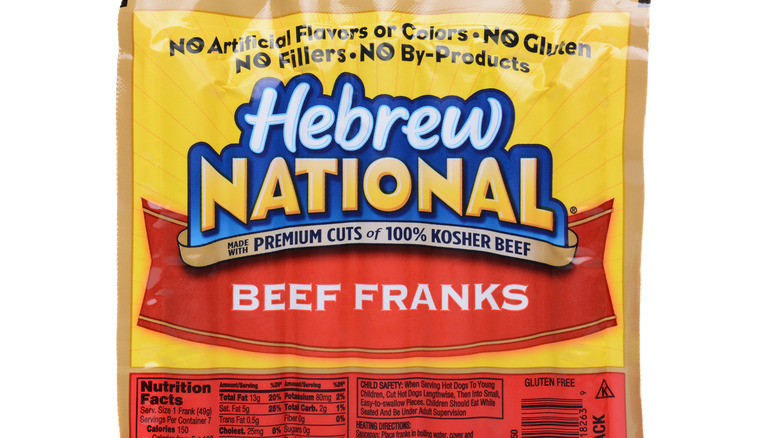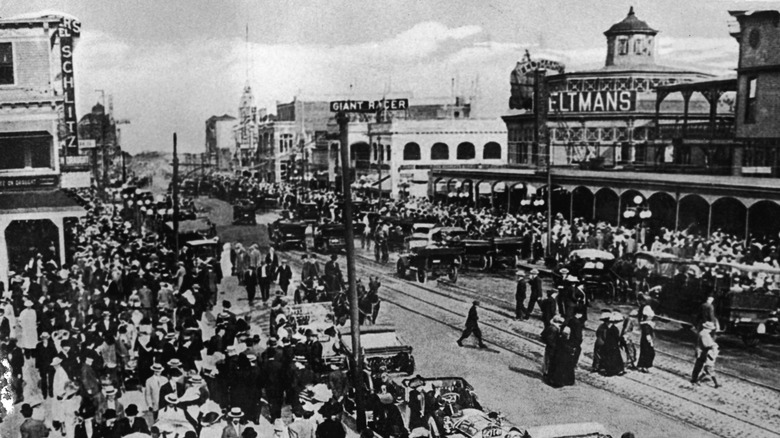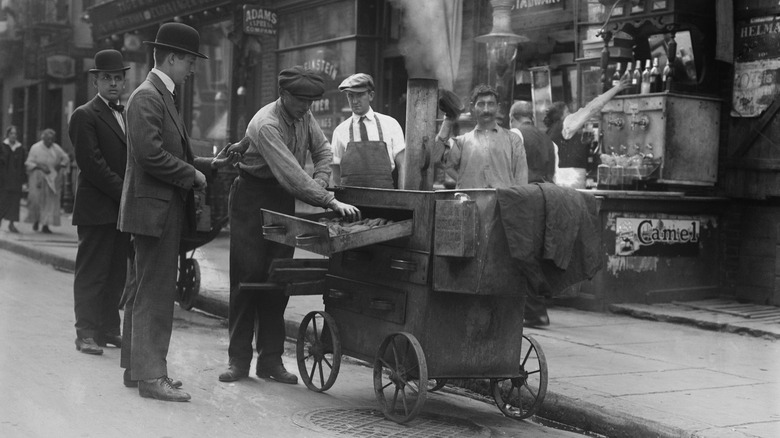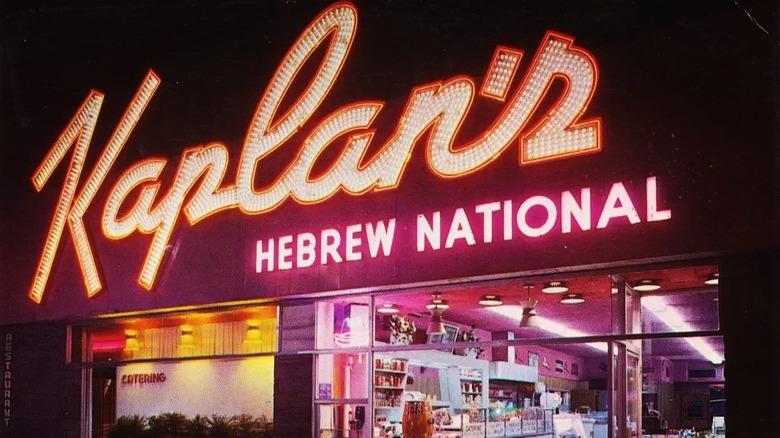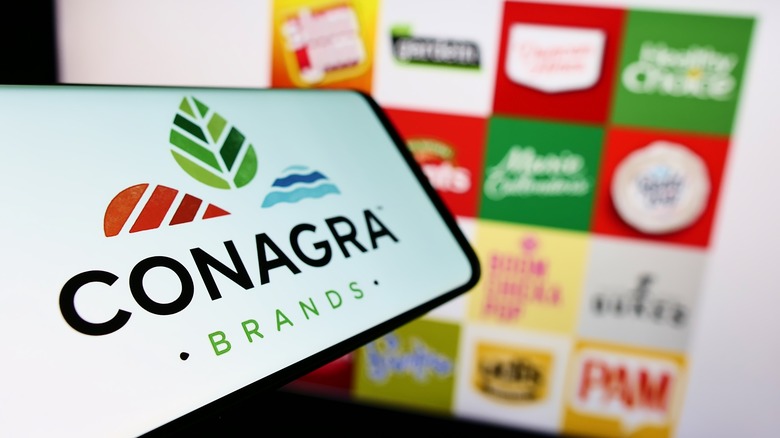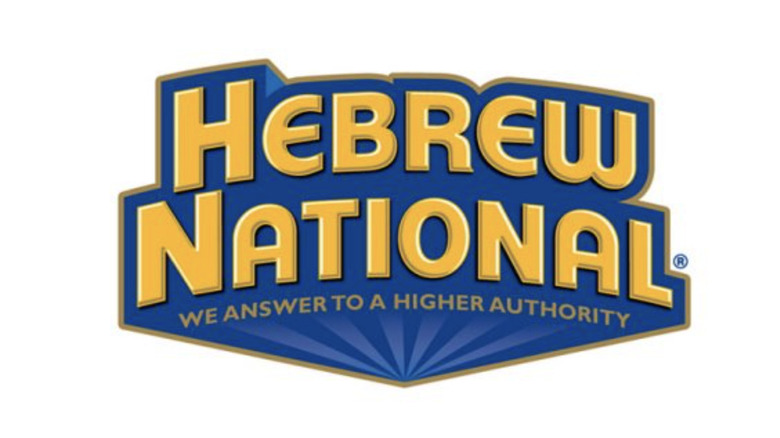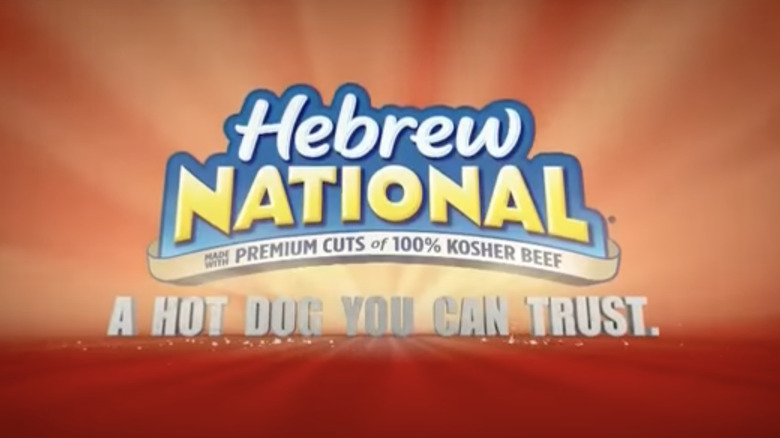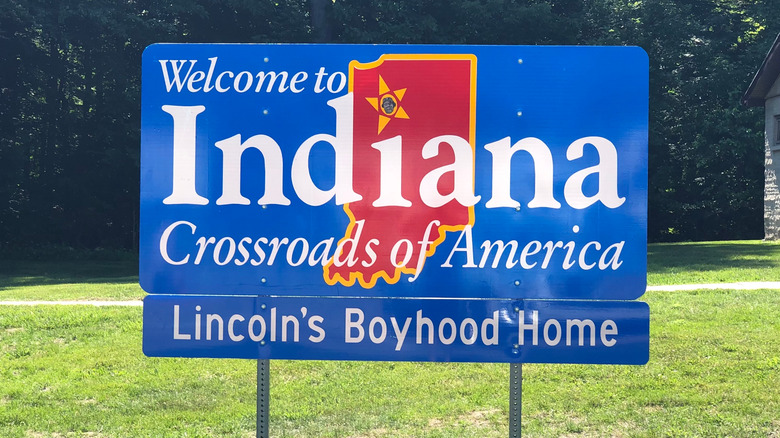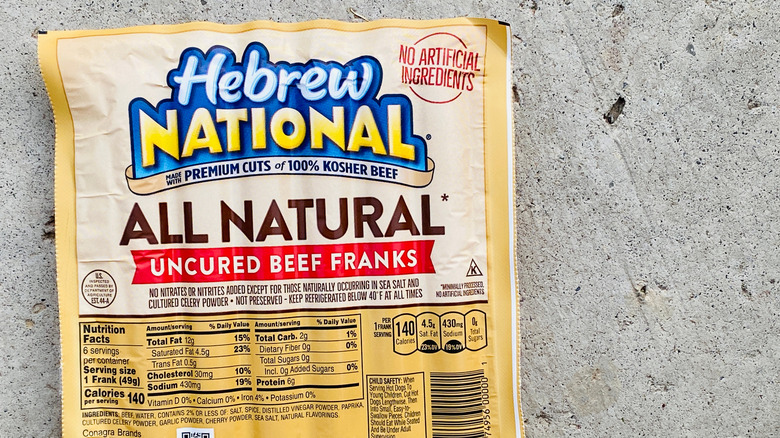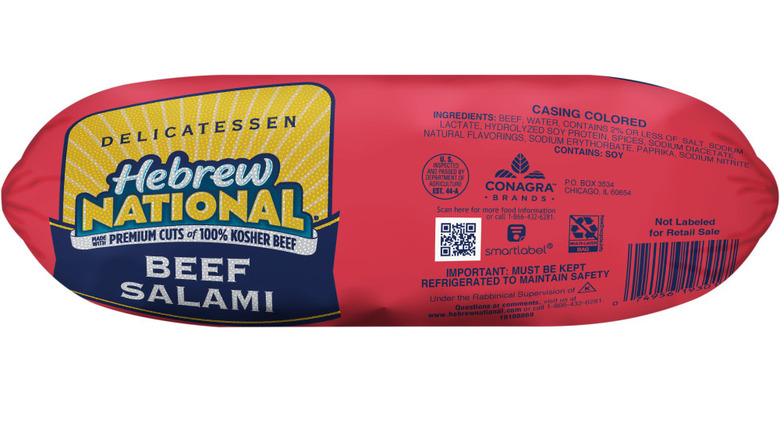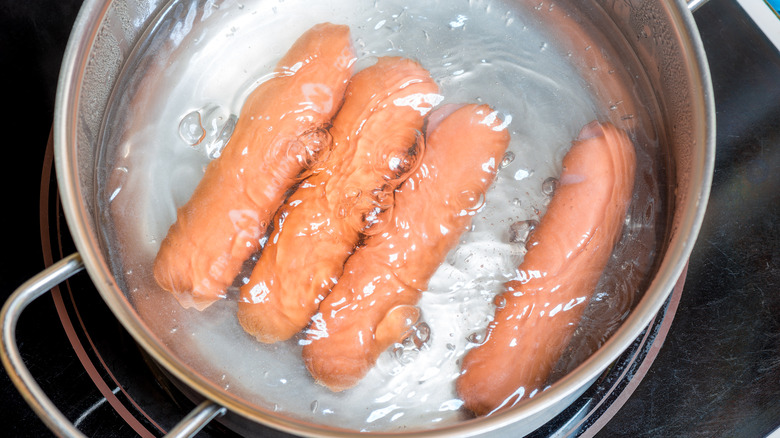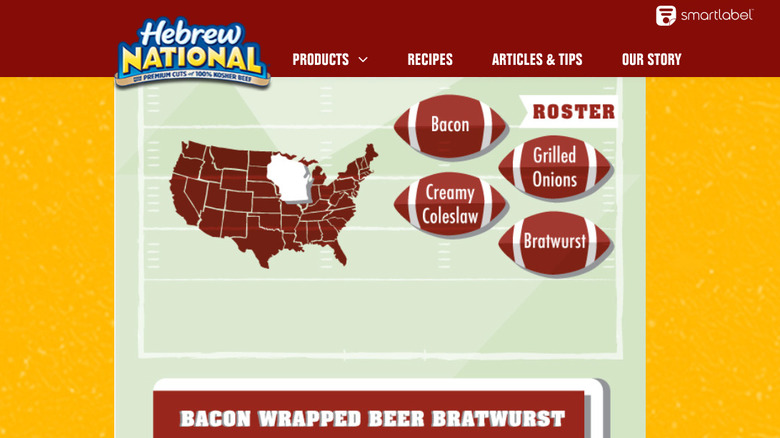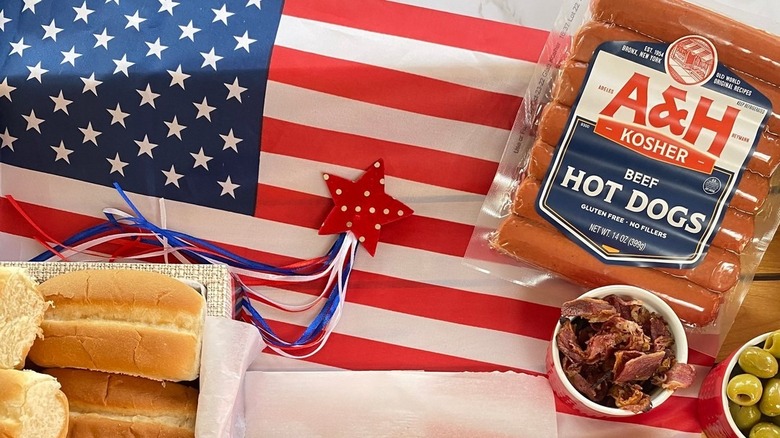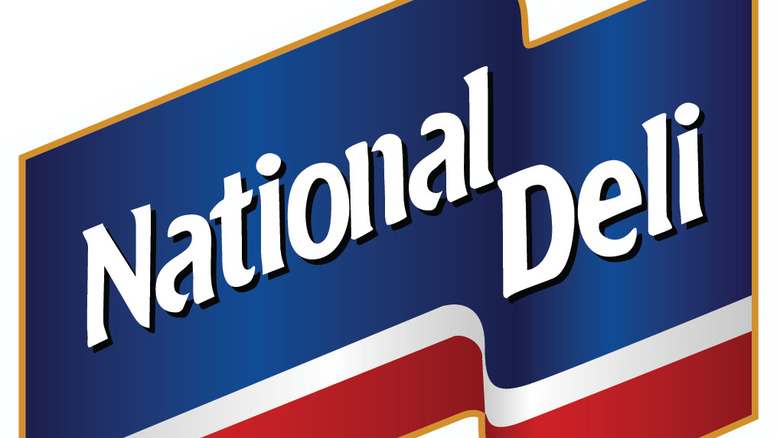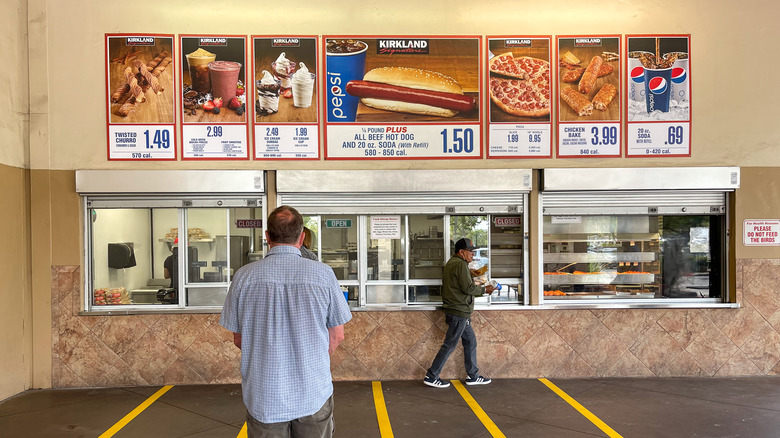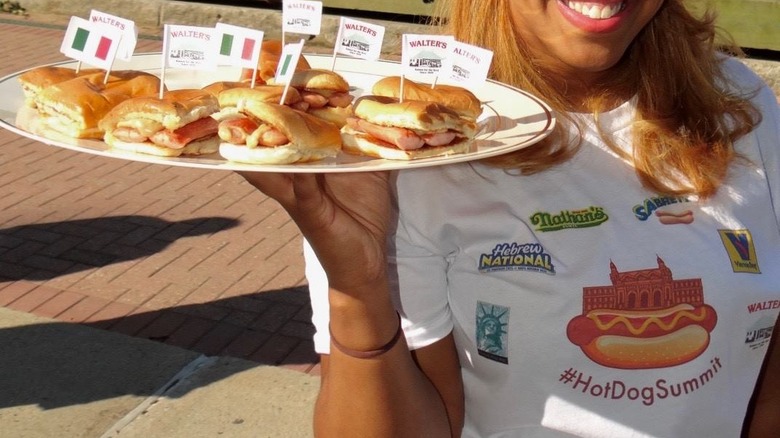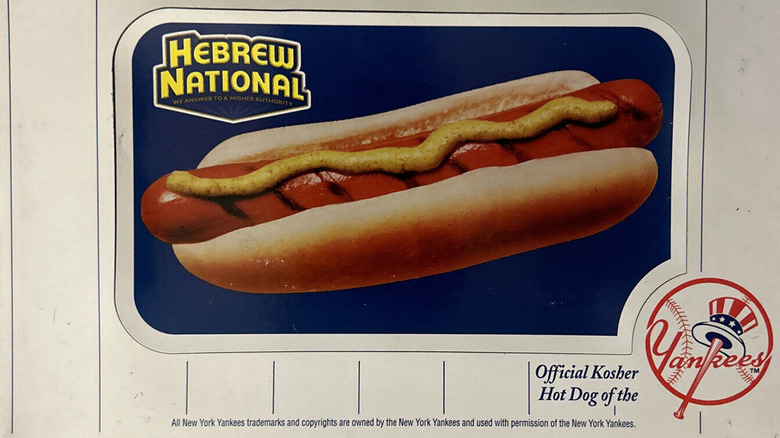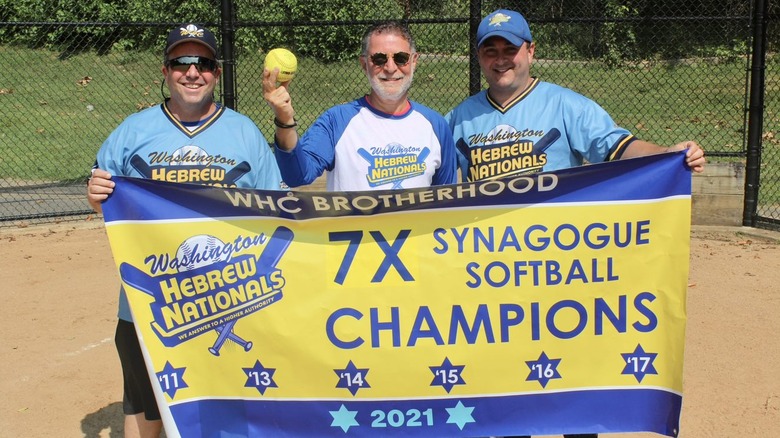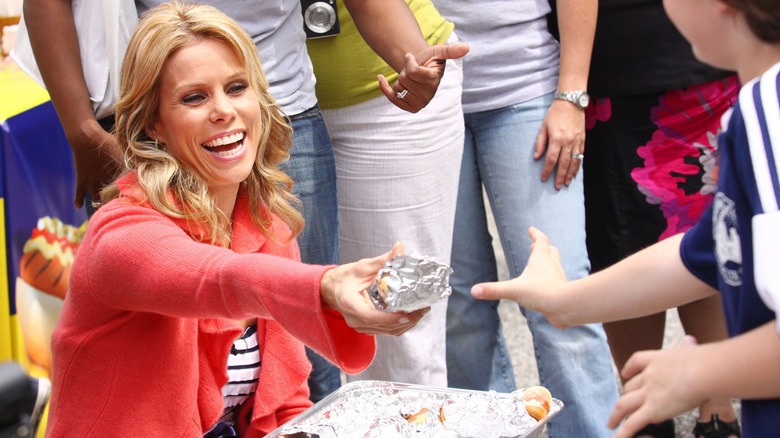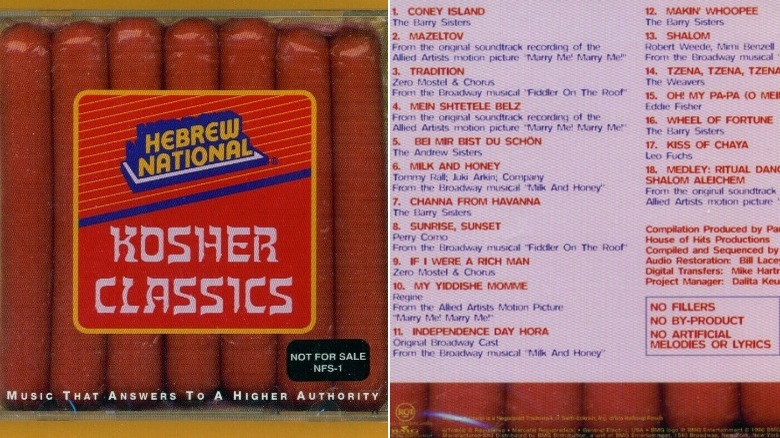Everything You Need To Know About Hebrew National Hot Dogs
Out of all the American hot dogs boiling and grilled, few are perhaps as well known, loved, and trusted as Hebrew National sausages. The company has been producing 100 percent beef franks since 1905. The sausages have been gobbled up on the streets of Manhattan's Lower East Side, Jewish delicatessens, and then everywhere else thanks to your neighborhood grocery store.
And it's not just Jews who love Hebrew National hot dogs: Out of the 6 million Americans who eat kosher today, 75 percent do not follow the Jewish faith. So grab some mustard (but keep the ketchup on the shelf) and relish in the rich history and delicious present of Hebrew National and its hot dogs. There's so much to know about these classic and iconic sausages: There's royalty, controversy, classic commercials, famous noshers, album covers, exciting dishes, mix tapes, and a lot of other bits and bites in between to unwrap.
The origins of the hot dog
The exact origins of the hot dog can be as murky as the water they sit in on a city street vendor's cart. Did the frankfurter hail from Frankfurt, Germany? Or was the wiener from Wein (Vienna) the first of its kind? What's unmistakable is that the modern hot dog was bred by immigrants who brought their love of sausages to America and popularized them.
How dogs were invented by Charles Feltman in 1867, and they were the perfect companion to the red hot summers in Coney Island. Former company employer Nathan Handwerker started his own shop to sell them in 1916.
The origin of the name "hot dog" is another story. The legend goes that caterer Harry M. Stevens introduced "dachshund sandwiches" in 1901 during a baseball game at New York's Polo Grounds, and New York Evening Journal cartoonist Tad Dorgan couldn't spell that, so dubbed them "hot dogs."
Hot dogs were further popularized through Oscar Mayer and his Wienermobile and the insistence on higher quality standards of meat production in the wake of Upton Sinclair's scathing "The Jungle," with Hebrew National leading the way as a standard bearer.
The history of Hebrew National hot dogs
Theodore Krainin was a Russian Immigrant who founded the Hebrew National Kosher Sausage Factory in 1905. The company was headquartered in New York's Lower East Side, and it sold goods that were guaranteed kosher), including roast squab, hamburger steak, and frankfurters, which were advertised as "The real thing."
Isadore Pinckowitz (sometimes spelled Isidore Pinkowitz) was a Romanian immigrant who was a necktie seller turned butcher who bought the sausage factory out of bankruptcy in 1928. Pinckowitz, nicknamed the Mayor of East Broadway, he maintained Hebrew National's reputation for selling high-quality goods (via The Standard Union). The company was also very charitable, donating food to those in need.
In 1935, in the honor of the mayor of Pittsburgh, he commissioned the construction of a hot dog that was five feet long, seven inches thick, and weighed almost 100 pounds. This giant piece of meat was dubbed by Louis Zeltner as the most incredible salami ever made by mankind.
A family-run business
Isadore Pinckowitz passed away in 1936, and the business was taken over by his son Leonard, who shortened the company's name to Hebrew National, and the family's surname to Pines. Under his watch, the parent company, known as National Foods Inc., grew beyond the streets of the Lower East Side and into delicatessens, and some stores even began carrying the name.
In the 1940s, the hot dogs become the first kosher ones to sell at a supermarket: Waldbaum's. Pines knew that in order to continue to expand and succeed, he needed to reach mouths outside of the Jewish community. The company went public in 1960, and that same year, Pines told The Sacramento Bee that he hoped to propagate Kosher foods just as Chinese and Italian dishes had been popularized. His hot kosher dog wishes would soon be cooking into a secular reality beyond his wildest dreams.
Mergers and acquisitions
The Pines family sold a majority of their ownership of Hebrew National's parent company National Foods to Riviana Foods in 1968 for $6.7 million and the balance of its shares the following year. Colgate-Palmolive acquired Riviana in 1976, with the Pines still working for the company.
In 1980, the family brought it back from a happy-to-unload Colgate-Palmolive. Six years later, the founder's grandson Isadore "Skip" Pines reflected on the re-acquisition and the growth of the family business, telling the New York Times that he was happy about the business and its growth.
In 1993, the Pines' ownership of Hebrew National came to an end as National Foods was acquired by ConAgra Inc for $937 million in stock. A year after the takeover, ConAgra's chairman, Philip B. Fletcher, told the Omaha World-Herald that the purchase was one of ConAgra's 'click' acquisitions and that its line of kosher products would go into Armour Swift-Eckrich, another division of ConAngra division
In 2021, news spread that America's largest beef producer, Brazil's JBS S.A. was in talks to acquire Hebrew National from ConAgra, although nothing appeared to come of it. For now, the kosher hot dogs remain in the family with other ConAgra brands like Slim Jim, Duncan Hines, Birds Eye, Chef Boyardee, Swiss Miss, Hunt's, and Hungry Man.
Hebrew National answers to a higher authority
In the 1960s, Hebrew National ran ads on TV that showed a soldier returning from war to the comforts of home, including deli meats. After seven years, the message would turn into what the second-best commercial of the century, according to The Miami Herald.
The advertisement campaign featured actor William Newman dolled up as patriotic Uncle Sam was created by the agency Scali, McCabe, and Sloves and debuted in 1972. Uncle Sam holds a hot dog while an all-knowing voiceover belittles the government's lax regulations for meat production, saying Hebrew National has no choice but to go a step further, answering to a "higher authority" as the camera tilts up to the heavens.
Founding partner Ed McCabe told Newsday that the ad was a way to help explain the concept of kosher to people and equate it with higher quality. Some stations weren't so keen on the ad that was a nod to God, but critic Tom Shales of The Washington Post hailed it a breakthrough as it contributed to the secularization of American culture and supplied America with its own brand of hedonism and an adoration of products. The advertisements ran for 20 years and helped to make Hebrew National a national brand.
The advertising campaigns
While the "higher authority" advertisements remain Hebrew National's best, there are plenty of other memorable ones from over the years. In the 1940s, the company had one featuring a salami-balancing boy, with the accompanying caption, ”For a well-balanced meal.” In the mid-70s, there was a print ad that proudly touted they were a pricey hot dog, but since they tasted so good, the money was no object.
In 1977, they gave Uncle Sam the day off and let a priest do all the sermonizing. He holds a hot dog, looks into the camera, and happily confesses he has converted to Hebrew National kosher hot dogs, stating that there was no such thing as a religious hot dog.
In 1992, the "higher authority" ads rolled on, but Uncle Sam was replaced by a hot dog manufacturer named Frank Weiner. Weiner, who didn't necessarily follow the letter to the kosher law, had much to answer on judgment day. Comedian Robert Klein took a turn as an almighty one, manifested as an omniscient hot dog street vendor, starting with a string of Grey Advertising penned ads in 1997.
The winks and nods continued into the 21st century, with the strongly messaged "No Ifs, Ands or Butts" ones winning an Effie Award. In the 2010s, the OG Batman, Adam West, crusaded for Hebrew National, saying it was better than any typical hot dog.
Going back to... Indiana?
For a New York-born and bred company, it seemed rather curious that Hebrew National would up and leave its plant in Queens and relocate to Indianapolis in 1986. "Indiana Pastrami?" ran the shocked New York Times headline, and the article noted that Jews make up less than 1 percent of the Hoosier's state population.
The company's hand was forced that year as a literally explosive strike by the United Food and Commercial Workers, and the three rabbi mashgiachs who supervise kosher production threatened supply in the short term and survival in the long term. Another concern was that the Indianapolis plant they were moving into formerly housed pork. In 48 hours, they steamed and boiled the place to make it kosher-ready.
Hebrew National's head rabbi, Tibor H. Stern, told the AP that they took extra care to do it right, saying that they were concerned because there was doubt in the minds of people. The company's brass wasn't too concerned, with Harvey Potkin, vice president of manufacturing, adding that people may expect a kosher product to be made in New York, but customers were unlikely to question a sun tan oil that was made in Minnesota
In 2002, Rabbi David Franz, who worked as an overnight mashgiach, died due to smoke inhalation stemming from a fire at the plant. Two years later, the Indianapolis plant was deemed too old and not worth upgrading, and ConAgra moved Hebrew National operations to a state-of-the-art facility in Quincy, Michigan.
The hot dogs are available in many varieties
Beef franks are the pride and joy of Hebrew National, and to suit the varying tastes of their customers or perhaps lure new ones, the company has added additional varieties for consumption over the years. There are the self-explanatory Bun Length Beef Franks and the Jumbo Beef Franks, which are double the normal size
Want the same great taste but also want kind to your waist? Reduced Fat Beef Franks (reduced from 13 grams to 8 in fat per serving) and 97 percent Fat Free Beef Franks (which have only 1 gram of fat per dog) are light delights. The All Natural Uncured Beef Franks are pure joy: They are not preserved and contain no artificial ingredients or nitrates. The company even sells Beef Knockwurst, juicy sausages which are seasoned for an old-world flavor.
The company also offers the Beef Franks In A Blanket. Both are solid picks for hors d'oeuvre at all hours, but for the latter, you're better off making your own, utilizing any of the aforementioned Hebrew National franks.
Cut them up into bite sizes, wrap them in Pillsbury Crescent roll dough, and even sprinkle on a little Everything But The Bagel Seasoning from Trader Joe's for an appetizer that will disappear into the mouths of happy eaters in mere minutes.
If you like the hot dogs try its other products
Hebrew National makes more than just hot dogs, and for fans of the brand, there are plenty more delicious pinkish-red meats where that came from. The company sells a variety of other cold beef products that can be found in both grocery stores and delicatessens across the globe, including lunch meats like beef bologna, deli-style beef bologna, corned beef, and deli pastrami.
Hebrew National's beef salami is perhaps the second most iconic item after the hot dog. "Tonight Show" host Steve Allen was such a fan that he gifted his studio audience with 10 pounders of them (handed out with the help of a young Regis Philbin) and was featured in Hebrew National print ads for his "Eggstasy" recipe.
Pop artist James Rosenquist paid his dues by painting their salami billboards in New York in 1957. The salami is sold in pre-sliced form, which is even better than its uncut whole version, which allows you to attain your desired thin or chunky thickness. The beef salami is also sold in a "lean" form.
There are several items Hebrew National used to sell but don't appear to do so anymore. Retired products include a deli mustard, pickles, sauerkraut, roast beef, beef fry (Kosher bacon), chicken salami, smoked turkey, rolled beef, liverwurst, and tongue.
Kosher, but perhaps not kosher enough
Despite priding itself on selling 100% kosher hot dogs and even explaining the how and why of doing so on its website, many don't consider Hebrew National products to be strictly kosher. Whether it fully is or isn't kosher enough depends on who you ask, and that's where things get complicated.
Since 2004, Hebrew National has received their kosher rabbinical supervision and certification from Triangle K, which has also handled the same duties for brands like Del Monte, Frito Lay, OreIda, Minute Maid, Sunny D, Hawaiian Punch, Wonder, and Hostess.
Yet many in the more orthodox Jewish communities don't consider Triangle K to adhere as strictly to the guidelines and preparation practices that would certify them as "glatt kosher" as Orthodox Union, better known as OU, does.
Triangle K's Rabbi Aryeh L. Ralbag told The Baltimore Jewish Times that while he'd love to make Hebrew National all glatt kosher, there isn't enough meat in the world to satisfy the glatt standards and demands.
Answering to the authorities
The question of just how kosher Hebrew National has persisted has not only been questioned in the court of public option but also in actual courts of law, forcing the company to answer to authorities on the ground. In 1985, a "kosher raid" was carried out at the Queens plant, and hot dogs found in hot water got Hebrew National in hot water with a higher authority.
Two years later, the Agriculture and Markets Department hit the company with a $39,800 civil penalty. Schulem Rubin, director of kosher law enforcement for the state agriculture agency, told UPI that the great company had many questions to answer.
In 2012, a class action suit was filed against Hebrew National's parent company, ConAgra, for representing kosher as the "New Organic," which is a promise of food purity amidst other products that have a lot of artificial ingredients. ConAgra spokeswoman Teresa Paulsen said in a statement that the company stood behind the quality of Hebrew National and its kosher classification. After an appeal, this case was later dismissed.
The company doesn't mind if customers also eat non-kosher items
For a company that prides itself on offering up 100 percent kosher beef, it certainly doesn't care if its customers follow the same strict dietary laws. That's fairly evident on its suggestion-heavy website, where hot dogs are beautifully put on display, topped, or served alongside such verboten treif (unkosher) as bacon, pork, shrimp, mussels, and clams. Cheese is also shown as a common coating, which would violate the kashrut law separating meat and dairy as spelled out in the Torah.
The Times of Israel spelled out this paradox, and Dan Skinner, public relations manager for Hebrew National, admitted to them that they're fine with grilling on both sides of the fence. He said that while some customers specifically purchase the products because they are kosher while other people eat hot dogs for reasons of taste and preference. For the latter customers, the company offers non-kosher recipes for the
The Times reached out to someone with a higher authority, Rabbi Menachem Genack, CEO of the kosher division of the Orthodox Union, who said that while a kosher product that is sold to the population is okay, if a company is selling kosher meats and there is confusion regarding the kosher status itself, that is likely a problem.
Hebrew National is not the only kosher company in town
There isn't just one brand that sells kosher hot dogs. Hebrew National first had to battle other frankfurter purveyors on the Lower East Side and then larger producers like Zion Meat Products Company for decades.
Hebrew National has seen competitors come and go. These days kosher certified dogs by Aaron's Best, Meal Mart, Romanian, Jack's Gourmet, Shor Harbor, Grow & Behold, Baldwin St., and Solomon's provide solid alternatives to the industry leader. The brand's closest rival is Abeles & Heymann (pronounced " Abel's 'n Hyman"), the provisions company founded by Oscar Abeles and his nephew Leopold Heymann in the Bronx in 1954.
The company was nicknamed and labeled A&H, and it is owned by Seth Leavitt, who is proud each time his dog tops Hebrew National's hot dogs in nationwide taste tests. In a 2021 press release, Leavitt said that he was very proud of the company's performance and high-quality standards in providing kosher provisions.
It once had a non-kosher subdivision called National Deli
In 1982, Hebrew National created a subdivision that would produce quality meat products (in Miami) that were kosher-style but not fully beholden to the kosher rules. Since National Deli was subject to fewer restrictions and costs, it could offer similar fare to its parent brand but at a much more reasonable price point to appeal to the mainstream market. When Hebrew National was taken over by ConAgra in 1993, the non-kosher entity came along for the ride, but in 2001 a group of former employees and investors purchased National Deli for $3.5 million and struck out on their own.
By 2007, National Deli was the largest manufacturer of authentic non-kosher premium deli meats in the country, pushing out 310,000 pounds a week. Their full line offered up "Old World Flavors" and "New World Ideas" in the form of corned beef, pastrami, salami, turkey, turkey pastrami, tongue, pot roast, prime rib, deli mustard, 20 different sizes of beef hot dogs, and 25 varieties of roast beef.
Marketing director Daniel Singer told The Miami Herald that a lot of your favorite restaurants probably serve National Deli products, but you wouldn't know it as this is not necessarily from National Deli. It is unclear who owns the brand today or if it's even in business. The last time the National Deli website was updated was in 2019.
A crown fit for a frankfurter Queen
Companies had to resort to gimmicks in order to keep kosher meats on the minds of eaters. In 1951, Hebrew National started dispatching "salami queens" to work in nightclubs to popularize the product (via The Daily News). That same year, rival Zion Meat Products Company threw its own sausage fest with actress Gene Courtney dressed totally tubular as Queen of National Hot Dog Week.
In October of 1952, to commemorate the hot dog's 100th anniversary and to celebrate Hebrew National's one billionth frank produced, Hebrew Nation crowned a "Frankfurter Queen." Jeanne Williams, decked out in a bikini and surrounded by suggestive wieners, was the first, who newspapers wryly noted relishes her role. Her likeness would resurface in the drawing of a "1993" Frankfurter Queen, which was featured in a Dwarves concert poster by artist Frank Kozik.
No full roster of Frankfurter Queens seems to exist, but among the reigning beauties who have been documented are 1956's Lorraine Cole and 1967's Leslie Franzos. Farnzos told The Daily News that the company never would've picked someone from Ballet Theatre. The closest return to a queen came briefly in 1987 when Lisa Levy dreamed up an advertisement campaign featuring a fit woman with the tagline "there's more fat on her than on our salami."
It used to be sold in the Costco food court
Through various recessions over the past few decades, there is one item that always seems to have been recession-proof: The hot dogs sold at Costco's food court. According to the company's own magazine, Costco Connection, it all started in 1984 with the only employee with food-service experience, Jay de Geus, selling Hebrew Nationals from a hot dog cart from a cart in front of a San Diego warehouse. Ever since then, the hot dog and soda combo price has remained at $1.50, and not a penny more.
By the end of 2008, kosher meat suppliers were dwindling, and hot dog availability became scarce. In order to keep that infamous $1.50 price tag the same, Hebrew National, one of two suppliers for Costco, was kicked to the curb and replaced by Costco's in-house Kirkland Brand. Kirkland sausages were 10 percent heavier than the old quarter-pound hot dogs that are made from 100 percent beef (Via Costco Connection).
Sadly, an online petition urging Costco to bring back the Hebrew National dogs, even if they had to increase prices, fell on deaf ears. CEO Craig Jelinek told 425 Business Magazine the brand figured out it could make its own Kirkland Signature hot dogs. Costco still sold Hebrew National products on its shelves for years. However, on a recent visit to a New York City Costco by Daily Meal, there were no Hebrew National products to be found anywhere.
Ellis Island celebrated Hebrew National's immigrant roots
Since Hebrew National's hot dogs are so closely associated with America and the immigrants from Europe and Russia, it made perfect sense for Ellis Island to host an exhibit about iconic hot dog brands that fit such a heritage. In 2017, the National Museum of Immigration put on display "Hot Out of the Melting Pot: A History of the Hot Dog in America," which highlighted frankfurter forefathers (and rivals) as Nathan's Famous, Sabrett, Vienna Beef, Walter's, and of course, Hebrew National.
The exhibit was the brainchild of Robert Uffer, general manager of Evelyn Hill Inc., the concessionaire of the Statue of Liberty and Ellis Island. He told Westchester Magazine that he wanted to hear the stories of the food companies that established themselves in the U.S.
Not only could visitors learn about the rise of these company's buns and the boiling of their franks, but they even had the opportunity to have a taste test of each in the museum's cafe. For only $9.95, mini versions of these fab fives' encased treasures were available to nosh on.
It's the official hot dog of many teams and stadiums
Hot dogs and sports have gone hand in hand (or perhaps hand to mouth) for well over a century, and Hebrew National is all about team spirit. At one point, the Hebrew National hot dogs sold (including half-pound, nine-inch large wieners) in half of Major League Baseball's stadiums (although Nathan's is currently MLB's top dog) and been the official kosher hot dog of the New York Yankees, and hot dog of Giants Stadium, Madison Square Garden, and ironically one of largest Catholic schools in America: St. John's University.
Hebrew National even lent its name to sponsor a lunchbox for the Washington Wizards (although Michael Jordan couldn't appear on it due to an endorsement deal with Ballpark Franks). In 1994, executive vice president at National Foods Martin Silver told the Los Angeles Times that while some people may laugh at them being called the official hot dog of anything, the move gives the brand a lot of consumer exposure.
Play ball!
Besides going to bat for the big guys, Hebrew National has also pitched and hitched its dogs on the unsung everyday Joes and Janes. In 2006, Hebrew National pitted four hot dog vendors from Detroit's Comerica Park against one another to see who Tigers' fans deemed worthy of the title "Higher Authority Hawker."
The event was the first of its kind (and perhaps last), and Charley "Opera Man" Marcuse bellowed his way to the crown. His reign didn't last forever, as Marcuse was fired in 2013 for possibly shunning customers who dared to ask for ketchup with their hot dogs.
Hebrew National has also been given the authority to have its name used for softball teams. One suburban Maryland squad has been batting as the Hebrew Nationals for over a decade, and a Jewish-related team in Albuquerque, New Mexico church affiliated softball league, not only got the company's blessing, but they even outfitted them with jerseys, hats, and bats as well. Team coach Scott Fliegel told Uni Watch that they all grew up eating Hebrew National hot dogs and that he will definitely be a Hebrew National customer moving forward.
Famous noshers
The public at large aren't the only fans of Hebrew National hot dogs, celebrities are too! In his biography, "Tattoos & Tequila: To Hell and Back with One of Rock's Most Notorious Frontmen," Mötley Crüe lead singer Vince Neil copped that he wasn't very kind to his body during the 1980s. He said that a bottle of Jack Daniel's and a packet of stolen Hebrew National hot dogs do not make for a nourishing diet. He notes that they didn't even bother cooking the hot dogs before eating them.
New York Times Bestselling author of "The Replacement," Brenna Yovanoff, admitted on Twitter that while she hates hot dogs, she loves Hebrew National hot dogs. Meaghan Oppenheimer, screenwriter and showrunner of Hulu's "Tell Me Lies" also took to Twitter to tell her truth that she isn't into hot dog filler, which is why she only eats Hebrew National hot dogs.
The politician, and son of a famous Washington Redskins coach, George Allen, learned of his Jewish roots later in life, to which he joked to Washington Post columnist Charles Krauthammer that it explained his liking for Hebrew National hot dogs."
As Larry David's long-suffering (ex-)wife on "Curb Your Enthusiasm," Cheryl Hines was, as Heeb called her, "The Accidental Shiksa." She certainly has a Jewish connection, and it served her well when she was more than happy to serve hot dogs up at the Hebrew National's Better-Than-a-Picnic program in 2010.
The hot dogs graced a Kosher Classics album cover
In 1996, Hebrew National released a mixtape (also available as a CD) that was the perfect background noise to play while enjoying fine meats or perhaps to spin at a budget Bar Mitzvah party. On the cover were packaged hot dogs with the Hebrew National logo and album title "Kosher Classics." This RCA release contained religious music, including 18 tracks, which cheekily contained, "no fillers, no by-product, no artificial melodies or lyrics."
Beloved songs and singers of yesterday fill 56 minutes of fun on this novelty album that's no joke. The roster consists of choice cuts from the likes of The Barry Sisters, Eddie Fisher, and Perry Como, as well as Broadway musical bites from the shows "Fiddler on the Roof," and "Milk and Honey," and from the film soundtrack of "Marry Me! Marry Me!" The best track on the entire album, which will get you up and dancing in no time, is "Tzena, Tzena, Tzena" by the Pete Seeger band, The Weavers. Don't despair; if you don't have a cassette deck or CD player, "Kosher Classics" is available on Spotify.
